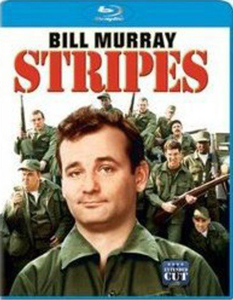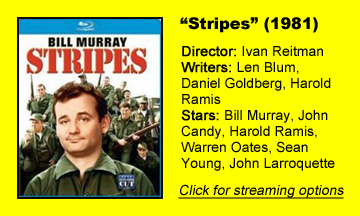After the lightweight “Meatballs” (1979) and the entertaining “Caddyshack” (1980), I’m back in the mode of “How did these guys end up making the brilliant ‘Ghostbusters’ (1984)?” when watching “Stripes” (1981). Actor Bill Murray, actor/co-writer Harold Ramis and director Ivan Reitman take on the U.S. Army in a scattershot fashion that’s thin on jokes, instead relying almost entirely on Murray’s and Ramis’ charms.
Loaded with future legends
As financially strapped, ennui-laden 20-something pals John and Russell, Murray and Ramis are of course the main reasons to watch the film. Runner-up status goes to John Candy as Ox, who joins the Army to lose weight for “free” (rather than paying for a gym membership), and the beautiful but underused Sean Young (“Blade Runner”) as Louise, a military policewoman who likes Russell mainly because the screenplay says she does (not that I blame Ramis for writing it that way).
Made at a time when the citizenry wasn’t particularly high on the Army, coming off Vietnam, “Stripes” views it all as a joke – although it’s still surprising that you rarely hear nationalists call the film blasphemous.
Maybe it gets a pass because it’s so obvious that people like John and Russell and Ox would not join the Army in reality.
Once they do, Ramis and co-writers Len Blum and Daniel Goldberg use a standard boot camp structure wherein Sgt. Hulka (Warren Oates, a real-life military veteran) rides the “comedian” John. Hulka could be a boot-camp instructor in a non-comedy, and that’s a problem here because no scene with him is funny; the arc reaches the typical crescendo wherein Hulka taunts John into taking a swing at him.
John does, and Hulka socks him in the stomach, affirming who is boss. Compare Oates to Ted Knight’s over-the-top performance as the rich guy in “Caddyshack” for the difference between dramatic acting and comedic acting in a comedy.
A few good gags
My favorite gags in “Stripes” are John’s and Russell’s sign-up scene, wherein they say they’ve never been convicted of a crime, and, while they are not homosexuals, they are willing to learn. The film also makes good use of the fragility of glass in cinema, as basketballs and Capt. Stillman’s (John Larroquette) telescope go flying through windows.
The mud-wrestling club scene is a good example of the Murray-Ramis-Reitman school of comedy. Introduce a ridiculous setting and then have talented people improvise their way through it. Candy mud-wrestling scantily clad women is naturally amusing, but this sequence – while standing out as something you don’t see in every comedy — lacks focus.
The back half of “Stripes” is rough. The goofy troop – without a leader because Hulka is sidelined – leaves Italy for Germany in a prototype RV-looking urban assault vehicle and actually engages in machine-gun battles with Russian soldiers. It never shows our heroes actually killing people, because that would change the movie’s tone too much, but at the same time, we’re always aware that it doesn’t show killings.

Neither funny nor serious
The movie is handcuffed from being either funny or serious; it’s just a slog. (By the way, while the “urban assault vehicle” might be a parody of military actions versus civilians if the film was more recent, it seems to be entirely coincidental in 1981.)
I watched the extended-length version of “Stripes,” which has 16 additional minutes – including Murray doing something he’s weirdly great at, making sex scenes hilarious. It seems like his scene partners (P.J. Stoles as Stella here) are truly giggling at Murray’s antics and not merely playing a part.
I’ll add a bonus half-star to my rating to account for the fact that the filmmakers know this version is too long for a first-time viewer; it’s for fans. But even the 1-hour, 46-minute theatrical cut must be a lot to sit through when you’re watching a standard boot-camp structure with something funny once every 15 minutes. It’s impossible to come away from “Stripes” disliking Murray, Ramis or Candy, but the film itself is hard to embrace.


